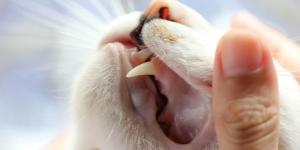My Dog's Baby Teeth Are Not Falling Out



See files for Dogs
You may not be aware that dogs have baby teeth. When your puppy matures, their dentition changes in a similar way to human beings. A dog's baby teeth, also known as milk teeth, primary teeth or deciduous teeth, are smaller and sharper than their adult teeth. They should naturally fall out of their own accord as their adult teeth develop. However, there may be occasions when the puppy's young teeth remain. We may first notice this because the adult teeth growing underneath cause discomfort and pain.
At AnimalWised, we find out why my dog's baby teeth are not falling out. We reveal more about the process of developing adult dentition and what we can do to help ease this process if there is a problem.
When do a dog's baby teeth fall out?
The arrangement and condition of a set of teeth is known as dentition. In canines, there are two types of dentition:
- Deciduous or primary dentition: commonly known as milk teeth which is made up of 28 individual teeth.
- Permanent or definitive dentition: 42 teeth should be present once the adult teeth have all developed.
A dog's baby teeth may look similar, but they are quite different from adult teeth when examine closely. The dentition is different in terms of arrangement and amount, but the individual teeth are also different. Dog milk teeth are sharper and a different shape to adult teeth.
The reason a puppy's teeth are so sharp is for various reasons. Firstly, since the mother is weaning her puppies, as their sharp teeth develop they start to hurt the mother's nipples. This helps to signal to the mother it is time for them to stop suckling and start eating solid food. They are also useful in helping puppies learn bite inhibition from each other.
Replacement of primary dentition by definitive dentition begins approximately in the third month of life. This process should end between 6 and 7 months of age. If you wonder why your puppy's milk teeth haven't fallen out and they are younger than this age range, you will need to be patient. After this time, if the baby teeth still remain in the puppy's jaws, we should start to consider there is a problem.
Poor tooth development is not the only problem which can affect a dog's mouth. Find out more with our article on why a dog's gums are bleeding.
Why are my dog's baby teeth not falling out?
When the adult teeth have not developed by 7 months of age, we will likely see the dog has both adult and baby teeth at the same time. This is to do with how adult teeth develop. When the puppy is maturing, the adult teeth erupt underneath the baby teeth and pus the latter out from their socket. The adult teeth should then sit comfortably in the dog's jaw.
If the baby teeth do not fall out, the adult teeth will still grow. This can be very painful for the young dog. Although it can happen in dogs of any breed or type, it is something which most commonly happens in small or toy dog breeds. The teeth that are most frequently affected are the canines (fangs), followed by the incisors and the premolars. If your dog does not lose their milk fangs, it will become a problem.
The reason why a puppy's milk teeth do not fall out is most commonly one of the following:
- Adult teeth growing in wrong direction: when the adult tooth does not grow properly, it does not put sufficient pressure on the root of the baby tooth. This means it is not reabsorbed and a double line of teeth can be observed.
- Migration of the permanent tooth germ: the tooth germ is the set of cells that are formed in the embryonic period to give rise to the future permanent tooth. When this germ migrates to an abnormal position, it will not push the root of the milk tooth and it will not fall out.
- Dental agenesis: congenital absence of one or more teeth due to lack of formation of the tooth germ during the embryonic period. As there is no permanent tooth, it will not put pressure on the milk tooth and will not cause its reabsorption.
It is worth mentioning that the persistence of the deciduous dentition must be differentiated from polyodontia. In polyodontia, a greater number of teeth are also observed in the oral cavity of dogs. In this case, it is not due to the persistence of milk teeth, but rather to the fact that there is a greater number of permanent teeth.
Once the dog's adult teeth have grown in, they are still susceptible to damage. Find out more with our article on why my dog's teeth are rotten.

What to do when a dog's baby teeth don't fall out
The persistence of milk teeth predisposes to the appearance of various oral pathologies:
- Periodontal disease: the coexistence of both types of dentition favors the deposition of bacterial plaque and dental tartar. If left untreated, this can cause premature periodontal disease in dogs, with gingivitis and periodontitis.
- Painful malocclusion: the persistence of the milk teeth prevents correct placement of the permanent teeth. In turn, this causes an inadequate occlusion between the upper arch and the lower arch.
- Gingival, palatal and dental trauma: improper placement of the teeth causes repeated trauma that can injure the oral mucosa and teeth.
- Dental fractures: misalignment of teeth causes abnormal wear that weakens them and predisposes them to fracture.
As soon as we see our dog's baby teeth have not fallen out when they should have, we need to take them to a veterinarian. They will either be able to diagnose the problem themselves or make a referral to a specialist. Any pieces of baby teeth which remain will need to be removed as soon as possible, most commonly under general aesthesia.
Oral surgery to remove baby teeth in dogs is often complicated by fractures of the teeth. This can result in remnants of the teeth remaining in the gums, as well as injury to the adult teeth underneath. For this reason, it is vital the process is carried out by a veterinarian specialized in canine dentistry.
Extraction of milk teeth in dogs should be done as soon as possible. The chances of the permanent teeth moving into the proper position decrease over time and orthodontic treatment will be necessary. In addition, the delay in extraction will gradually aggravate the symptoms associated with persistent milk teeth.
Finally, it is important you take into account the following recommendations. Until your dog's primary dentition is completely replaced, it is important you observe the progress of the adult dentition. Look out for any malocclusion or other problems which we described above. If we see a problem, do not hesitate to take them to the veterinarian. Once tooth replacement is complete, remember the importance of canine oral hygiene. Brush the dog's teeth every 2-3 days and use products designed specifically for dogs.
Learn more with our article on how to clean a dog's teeth.
This article is purely informative. AnimalWised does not have the authority to prescribe any veterinary treatment or create a diagnosis. We invite you to take your pet to the veterinarian if they are suffering from any condition or pain.
If you want to read similar articles to My Dog's Baby Teeth Are Not Falling Out, we recommend you visit our Other health problems category.
- Castejón, A., de la Morena, M., San Román, F., Fernández, JM, San Román, F. (2016). Canine and feline pediatric dentistry . Clin. Vet, Peq, Anim; 36(2);79-89
- Fernandez, J.M. (2014). Dentistry in the daily clinic . Association of Spanish Veterinarians Specialists in Small Animals.






